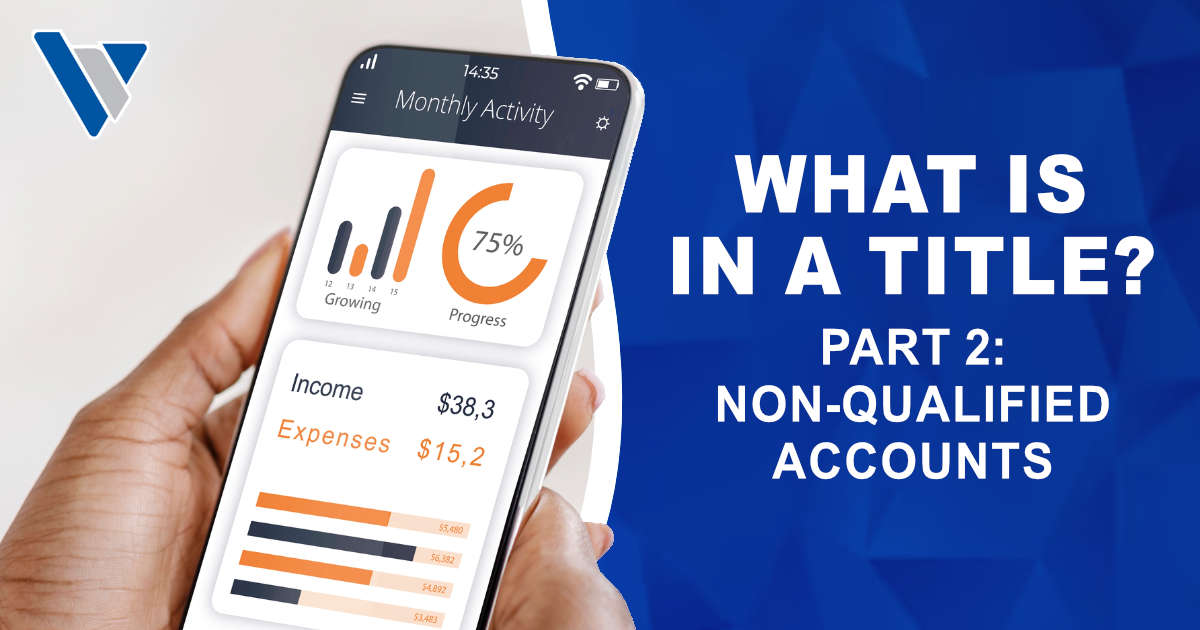In my last article, I discussed the importance of proper titles in regards to qualified accounts,...


These days it’s easy to do a quick internet search for current mortgage rates or CD rates. Your credit score, mortgage calculator, refinance calculator, and loan calculator are all just a click away. But does the ease of access replace the need for a financial advisor in 2022? Most people still say no. Just because you can now do online debt consolidation, manage your student loans, and even do a bit of retirement planning online, doesn’t mean you’re making the right moves at the right time.
“With so many easily accessible financial options, we see more and more people venturing out on their own when it comes to investing their finances. Unfortunately, in many cases, those same people are getting themselves into situations that don’t work with their lifestyle and financial goals.” Karen Spence
Financial planning is more than just trying to make a quick buck off the assets you already have. There’s a finesse to it that many people don’t fully understand. Not only do you want to make your money work for you, but you want to do it in a way that aligns with your goals while minimizing risk. You need to know when to change what you’re doing and when to stay the course. Financial planning is planning for the future in a way that helps you pursue your goals. But with so much conflicting information on the internet, how do you find someone you can trust that understands all of these things?
Gone are the days when financial advisors were only for those individuals who had extra money to throw around. In fact, financial planning is more important than ever for people in all sorts of financial situations. Everyone can benefit from the financial advice and financial guidance of certified financial planners. However, not all financial advisors are created equal. Here’s a quick guide on how you can find the best financial advisor for your needs in 2022.
There are a variety of reasons why you might need financial guidance. It’s also entirely possible that you don’t know why you need advice. Not everyone knows what they want their future to look like. The past few years have really taken their toll on people mentally, physically, emotionally, and financially. A lot of people are stuck in survival mode, just trying to make it from one day, week, or month to the next. If this sounds like your situation, then take this as your sign to take a deep breath and start looking to the future once more. Survival mode isn’t sustainable. We’re here to help you find the financial guidance you need.
“The past few years have been overwhelming for a lot of people. Instead of waiting for a sense of normalcy, it’s best to take action now. The steps you take today can help shape your future into what you want it to be.” Brian Tillotson
You may already know why you want to seek out a financial advisor. If so, that’s great! If you’re not sure, then start by thinking about any major life changes you’ve gone through recently or are planning on going through. These can include:
Each life-changing event not only changes our circumstances, but it also shapes our worldview. For example, when you have a child, that child’s education may suddenly take priority over other financial goals.
Sit down and think about your financial goals. Here are some great questions to consider:
Allow yourself to think about the future and what you want it to hold for you and your loved ones. Most people aren’t aiming for just one goal. You may want a nice retirement, to pay for your child’s college education, and to care for your elderly parent, all while starting a business.
Whatever your future looks like to you, you want to make sure you find a financial advisor with the skills, knowledge, and experience in that field. They should be able to offer guidance and support for your specific financial needs.
This list includes some of the financial services offered by advisors:
Now you know why you want a financial advisor. The next step is learning about different types of financial advisors.
“It’s important to understand that there’s no specific federal law that regulates who is legally allowed to call themselves a financial advisor or offer financial advice. Just because someone includes the term “Financial Advisor” in their title doesn’t mean that they have the education necessary to provide you with great guidance and advice. It also doesn’t mean that they have your best interests at heart. It’s vitally important to evaluate any potential advisors you’re considering to make sure they are qualified, experienced, and the right choice for you.” Chuck Elhoff
The most important aspect of learning about the different types of advisors is understanding fiduciary duty. Fiduciary duty means that they are legally required to work in your financial best interest. Not all financial advisors are bound by fiduciary duty. Others may just be held to a suitability standard. This simply means that they are only allowed to suggest products that are suitable for you and your situation, even if they’re more expensive, therefore earning them a higher commission.
It’s also important to understand how a financial advisor makes money. This is helpful when it comes to deciding if their advice is better for you or just better for their own wallet. There are four basic types of financial advisors:
“A CFP designation is the gold standard when it comes to financial planning. This indicates that the advisor has passed rigorous exams regarding investment, insurance planning, as well as real estate. They also have years of experience in their field.” Chuck Elhoff
A certified professional financial advisor will be able to provide guidance on personal finances, investments, tax laws, and asset management. They’re able to help teach you better habits for spending money, saving money, and borrowing money. Many people think of them as financial coaches. They help individuals make financial decisions based on the information they provide. In addition, they also are experienced in investment management. Even so, many tend to have different specialties.
Think back to why you wanted a financial planner in the first place when considering one of the following:
Be open and honest about your financial goals when speaking with potential financial advisors. While referrals are great, keep in mind that your financial situation may be different than the person who referred you to a specific advisor.
The most important thing to keep in mind when hiring a financial advisor is finding someone who is qualified to help you with your financial plan and financial goals. Call potential advisors to set up calls or appointments. Don’t be afraid to ask questions. Ask about their credentials, pay structure, and anything else you worry about. Remember that this is your money that’s on the line.
Here are some questions you may consider asking potential investors during your initial consultation:
It’s also important to ask questions about your specific situation. For example, if you’re a small business owner you may want to ask if they have other clients that own small businesses.
“If an advisor won’t answer your questions or discuss the details of how they do business then move on to someone else. Transparency is very important when it comes to how they will handle your money and how they get paid for doing so. Not answering questions are definite red flags when it comes to this industry.” Brian Tillotson
The absolute best way to protect your best interests is to select a financial advisor or financial analyst who voluntarily chooses to minimize conflicts of interest while adhering to a high fiduciary standard.
Unfortunately, there are some scammers out there who try to pass themselves off as financial experts and advisors. Thankfully, there are ways to protect yourself. You can search to find out if a financial advisor is registered with the SEC and FINRA. You’re also able to see if prospective advisors have any disciplinary action or lawsuits filed against them using the SEC’s IADP and FINRA’s Brokercheck.
Even legitimate financial advisors can engage in fraudulent activity. Legitimate, trustworthy advisors set realistic expectations when it comes to potential earnings. They’ll provide you with a risk assessment associated with each investment. They’ll disclose any potential conflicts of interest. And, most importantly, they’ll always act in your best interest.
Red flags to watch out for include:
These are some of the most common forms of investment fraud:
Don’t rush into choosing a financial advisor. Take your time to do your research and find the best one for your needs and goals.
Reach out to the experienced financial professionals at Virtus Wealth Management to learn more about the services we offer and how we can help you get on the path to pursuing the goals you’ve set for your financial future. Contact us today at 817-717-3812 to speak with one of our qualified financial advisors. We are happy to sit down and discuss what you’d like to see in your future to help establish a plan that takes your goals into account while working within your level of risk tolerance.
Securities offered through LPL Financial Member FINRA/SIPC. Investment advice offered through Good Life Advisors, LLC, a registered investment advisor. Virtus Wealth Management and Good Life Advisors, LLC, are separate entities from LPL Financial.